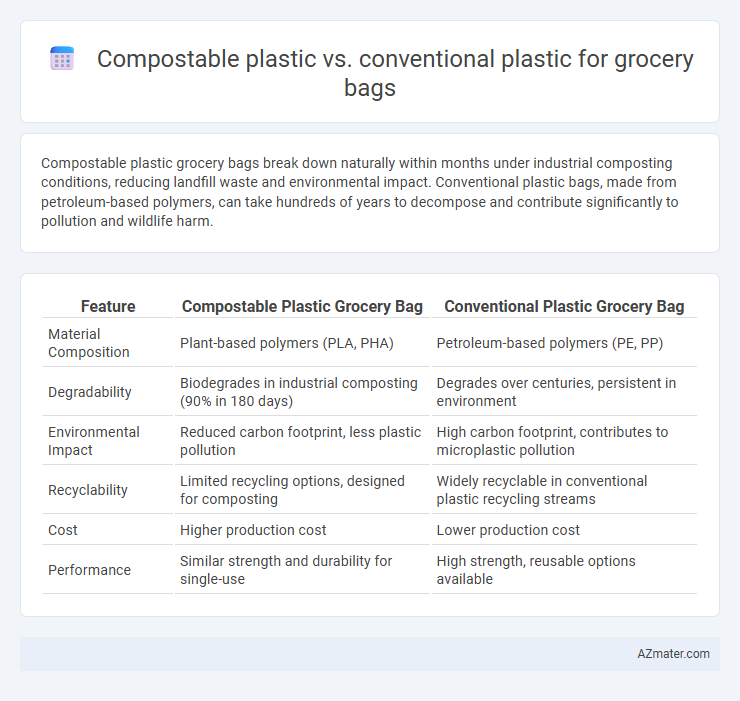Compostable plastic grocery bags break down naturally within months under industrial composting conditions, reducing landfill waste and environmental impact. Conventional plastic bags, made from petroleum-based polymers, can take hundreds of years to decompose and contribute significantly to pollution and wildlife harm.
Table of Comparison
| Feature | Compostable Plastic Grocery Bag | Conventional Plastic Grocery Bag |
|---|---|---|
| Material Composition | Plant-based polymers (PLA, PHA) | Petroleum-based polymers (PE, PP) |
| Degradability | Biodegrades in industrial composting (90% in 180 days) | Degrades over centuries, persistent in environment |
| Environmental Impact | Reduced carbon footprint, less plastic pollution | High carbon footprint, contributes to microplastic pollution |
| Recyclability | Limited recycling options, designed for composting | Widely recyclable in conventional plastic recycling streams |
| Cost | Higher production cost | Lower production cost |
| Performance | Similar strength and durability for single-use | High strength, reusable options available |
Introduction to Grocery Bag Materials
Grocery bags are commonly manufactured using traditional polyethylene, a conventional plastic derived from fossil fuels known for durability and low cost. Compostable plastics, made from renewable resources like cornstarch or polylactic acid (PLA), offer an eco-friendly alternative designed to break down under industrial composting conditions. Material choice impacts environmental footprint, biodegradability, and regulatory compliance within the grocery sector.
What Are Compostable Plastics?
Compostable plastics are derived from renewable biomass sources such as corn starch or sugarcane and are designed to break down into natural elements within a composting environment, usually within 90 days. Unlike conventional plastics made from petroleum-based polymers that persist in the environment for hundreds of years, compostable plastics decompose into water, carbon dioxide, and biomass without leaving toxic residues. These materials meet standards like ASTM D6400 or EN 13432, ensuring they safely biodegrade under industrial composting conditions, making them a sustainable alternative for grocery bags.
Understanding Conventional Plastics
Conventional plastics used for grocery bags are primarily made from petrochemicals like polyethylene, which are durable and inexpensive but contribute significantly to environmental pollution due to their non-biodegradable nature. These plastics persist in landfills and oceans for hundreds of years, releasing harmful microplastics and toxins that disrupt ecosystems and wildlife. Understanding the chemical stability and environmental impact of conventional plastics is crucial for evaluating alternatives like compostable bags.
Environmental Impact: Compostable vs. Conventional Plastic
Compostable grocery bags, made from plant-based materials like cornstarch or polylactic acid (PLA), break down into natural elements within 90 to 180 days in industrial composting facilities, significantly reducing landfill waste and greenhouse gas emissions compared to conventional plastic bags. Conventional plastic bags, primarily made from polyethylene derived from fossil fuels, can take hundreds of years to decompose, contributing to long-term environmental pollution and microplastic contamination in oceans and soil. The shift to compostable plastic bags supports sustainable waste management by enabling nutrient recycling and lowering carbon footprints, whereas conventional plastics persist as a major cause of habitat destruction and increased carbon emissions.
Decomposition Rates and Lifecycle Analysis
Compostable plastic grocery bags decompose within 90 to 180 days under industrial composting conditions, significantly faster than conventional plastic bags that can persist for over 500 years in landfills. Lifecycle analysis reveals compostable bags generate lower greenhouse gas emissions and reduce landfill volume, although their benefits depend on proper composting infrastructure and consumer participation. Conventional bags, derived from fossil fuels, contribute to higher carbon footprints and long-term environmental pollution despite their widespread recyclability challenges.
Performance and Durability in Daily Use
Compostable plastic grocery bags typically degrade within months under industrial composting conditions, offering reduced environmental impact but lower durability compared to conventional plastic. Conventional plastic bags provide superior strength and resistance to tearing, making them more reliable for carrying heavy groceries and repeated use. However, their long degradation period contributes to persistent pollution, whereas compostable alternatives prioritize eco-friendly disposal at the cost of performance longevity.
Cost Comparison for Retailers and Consumers
Compostable plastic grocery bags typically cost 20-40% more than conventional plastic bags, impacting retailer expenses and potentially consumer prices. Conventional plastic bags benefit from lower production costs due to widespread manufacturing processes and raw material availability, making them more economically attractive for high-volume use. However, compostable bags may reduce long-term waste management costs and appeal to environmentally conscious consumers, influencing retail purchasing decisions.
Recycling and Disposal Challenges
Compostable plastic grocery bags require specific industrial composting facilities to break down effectively, which are limited in availability, often leading to improper disposal and contamination of recycling streams. Conventional plastic bags, predominantly made from polyethylene, pose significant recycling challenges due to their lightweight nature and tendency to clog machinery, resulting in low recycling rates and high landfill accumulation. Both materials present disposal complexities, but the lack of standardized infrastructure for compostable plastics intensifies environmental management issues compared to conventional plastics.
Legislation and Industry Trends
Legislation increasingly favors compostable plastics for grocery bags, with regulations in the EU and several US states mandating biodegradable alternatives to reduce environmental impact and landfill accumulation. The industry trend shifts toward sustainable packaging, driven by consumer demand and government incentives, prompting major retailers to adopt compostable grocery bags made from plant-based polymers. Advances in compostable plastic technology enhance durability and cost-effectiveness, positioning it as a viable replacement for conventional polyethylene bags within the emerging circular economy framework.
Future Outlook for Sustainable Grocery Bags
Compostable plastic grocery bags, made from renewable resources like cornstarch, offer a promising future with lower carbon footprints and enhanced biodegradability compared to conventional plastic bags derived from petrochemicals. Innovations in compostable materials are expected to improve durability and reduce production costs, facilitating wider adoption among retailers and consumers seeking sustainable alternatives. Regulations banning single-use plastics worldwide will accelerate the shift toward compostable options, driving advancements in recycling infrastructure and supporting a circular economy for grocery bags.

Infographic: Compostable plastic vs Conventional plastic for Grocery bag
 azmater.com
azmater.com